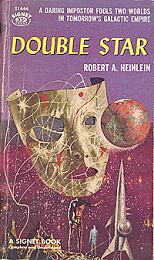
Double Star
Robert A. Heinlein
127 pages
published in 1956
There are times when you can no longer understand why Heinlein has such a good reputation in science fiction, considering his often pernicious influence on other writers and the vileness of his later books, when even the "good Heinleins" do not look so good anymore in retrospect. At such times, it's good to reread a novel like Double Star and remember why you liked Heinlein in the first place. Double Star has long been one of my favourite Heinleins, but after this reread it may just very well be my alltime favourite. It has all of Heinlein's strenght and few to none of his weaknesses.
If you're familiar with Heinlein, especially late Heinlein, you'll know these weaknesses: a tendency to preach and pontificate, a weakness for obnoxious blowhards as his heroes, an inordinate fondness for incestious relationships... None of these are present here. Instead you get Heinlein at his best, packing a rollicking adventure story, political intrigue and a fully realised future in less than 128 pages.
Double Star is told as a first person narrative, centered on Lawrence Smith, an out of work actor who bills himself as Lorenzo the Great. Down on his luck he spents his last half credit on a drink for a spacer in disguise, who is so impressed by his ability to see through it that he hires him on the spot for a job. Meeting up in the spacer's hotelroom, Lorenzo is just starting to demand what exactly the job entails, when a Martian knocks on the door and attempts to kill them. Obviously this is not going to be a tour of zero g Shakespeare.
No, it turns out that Lorenzo was hired to impersonate Joseph Bonforte, one of the great statesmen of the age, leader of the Expansionist opposition, which wants humanity to colonise the stars hand in tentacle with the other inhabitants of the solar system, the Martians, Venusians and others. Bonforte however has been kidnapped, only days before he's due to be inducted into the Kkkah nest, one of the oldest and most influential Martian "families". And since the Martians have a sense of honour and debt that makes the Japanese samourai look like a bunch of anarchists, the show must go on. Which is where Lorenzo comes in: he has to fullfil the role of his life by playing Bonforte until the latter can be rescued from his kidnappers.
Now Lorenzo is as apolitical as they come, with no interesting in anything but his art, little knowledge of politics and no sympathy at first for Bonforte's politics. However through learning about Bonforte and studying his speeches and statements he feels a growing admiration for the guy and his politics. Which is just as well, because the job quickly turns from a simple, limited time impersonation into something far more complex.
When I first read Double Star I didn't know that Heinlein, before he became the mostly rightwing curmudgeon science fiction author we know and love, was active in leftwing politics in California, as part of Upton Sinclair's EPIC campaign. This may explain the authentic feel of the political campaigning shown in the second half of the book, something I haven't seen in any other Heinlein novel. The whole political setup in Double Star felt much more real and convincing than usual with Heinlein. As with his dilating doors, Heinlein only sketches how politics work in the future. He does this in a way that shows that it's not some idealised system springing fullborn from the brow of Zeus, but something that has a lot of history behind, with obscure rituals surviving out of tradition rather than usefulness, filled with compromising and unwritten rules. Just like the ones we have now, in other words. And I'm not just saying that because Heinlein made the Dutch royal house into the imperial rulers of the Solar System....
The rest of the future Heinlein sketches here is the usual sort of golden age sf universe, with intelligent, weird but understandable life on Mars and Venus, cheap interplanetair travel, but societal norms not much changed from when Heinlein was writing -- you can imagine teenagers hanging out on the corner drugstore in Marstown before riding their rocket hotrods to Phobos for the evening. Dated, yes, but also oddly charming. For me this sort of defines real science fiction, with the same sort of stock future turning up in hundreds of stories by dozens of writers. This future works here because Heinlein only has to allude to it and let his experienced readers fill in the details, so he can concentrate on the more original aspects of it, like the political system mentioned above.
The shape of the story is of course also familiar to dedicated Heinlein fans: that of the self centered man who learns that he has a higher duty to mankind to fulfil, a coming of age story Heinlein repeated in most, if not all of his early novels. The distinction here is that Lorenzo is somewhat older than the usual Heinlein hero. Heinlein also gives him a background that explains perfectly where Lorenzo comes from, what made him into the man he is at the beginning of the story, fundamentally decent but somewhat of a failure.
So yeah, this may very well be Heinlein's best novel.
Read more about:
Robert A. Heinlein,
Double Star,
science fiction,
book review